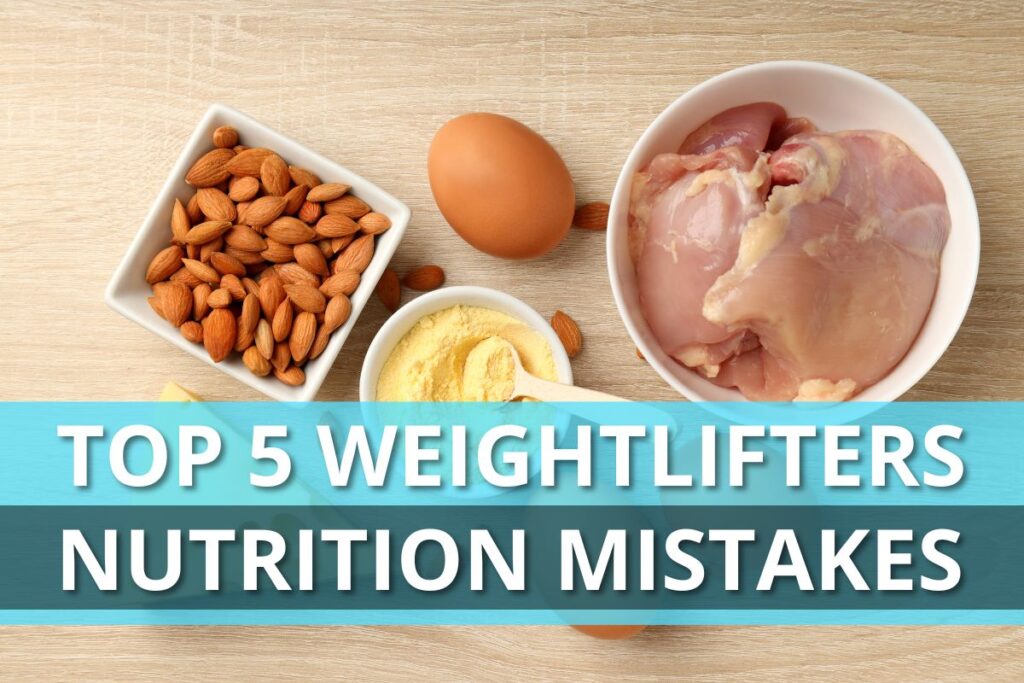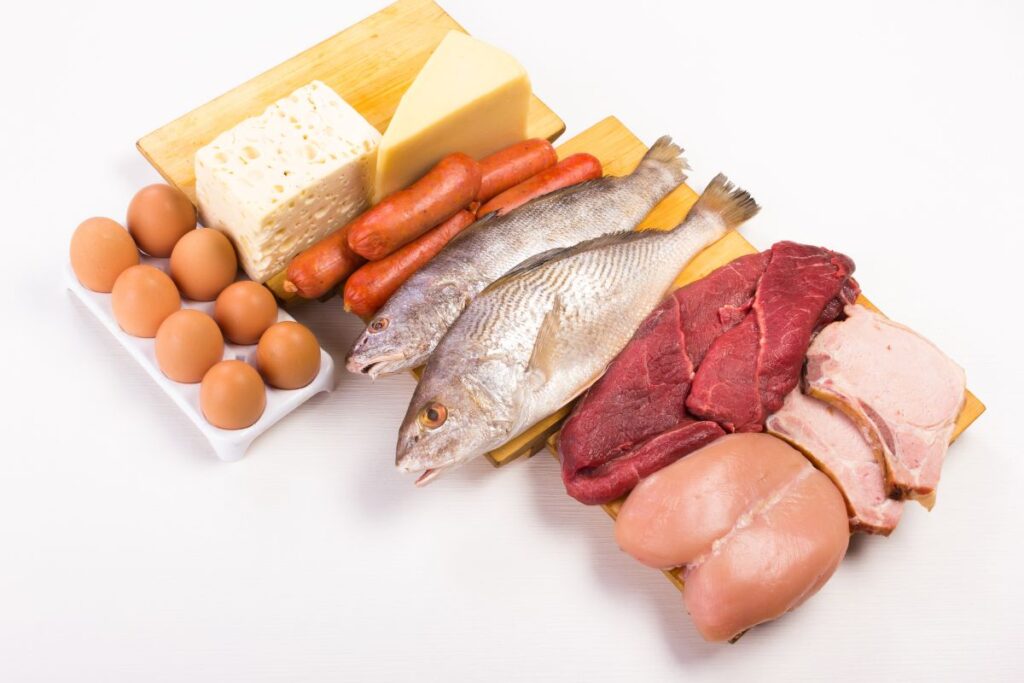Top 5 Weightlifters Nutrition Mistakes
Author:
Unlock your full potential by engaging with our experts and community! Have questions about your fitness journey or looking for expert advice on weightlifting techniques? Don’t hesitate — leave a comment below and Sergii Putsov will provide a personalized answer and insights to help you reach your goals.
Torokhtiy is reader-supported. Some links are affiliate links, and we may earn a commission at no extra cost to you. See our disclosure page for details.

Many people underestimate nutrition and its effect on physical performance and your success in weightlifting. And in vain, because sometimes even point changes in the diet can cost a place on the pedestal. If your competitor uses all the ways to optimize physical performance, and you do not, then you are in trouble.
Diet adjustments and lack of laziness can significantly affect your sports results. In this article, I’ll cover the 5 most common nutritional mistakes weightlifters make.
Mistake 1. – not eating enough calories
This mistake leads to a loss of muscle mass, severe fatigue during training and, as a result, will decrease your physical performance. Lack of energy consumption (women) can even end up with menstrual disorders, and in the worst case, loss of it.
Another consequence of a lack of energy and associated fatigue is loss of concentration, poor coordination, and bad exercise technique. When you have a 170 kg barbell on your shoulders, it is fraught with consequences. Up to injury, which can negate a whole preparatory cycle lasting several months.
You may like it:
On the one hand, many athletes are in a state of chronic energy and nutritional deficiencies that have a negative impact on their performance. Other weightlifters eat well but cut calories too aggressively in preparation for competition. In both situations, you cannot expect to maintain good training performance.
If you are chronically malnutritioned I recommend increasing your calories by 100-150 kcal and monitoring your well-being both during training and during rest. If the task is to enter your weight category (to lose weight), I recommend:
- During the off-season, do not go beyond the limits of your weight category by more than 5-7 kg;
- Plan preparation in advance – at least 10-12 weeks before the competition;
- Lose weight slowly, without an aggressive calorie deficit;
- Do not cut carbs too much.
These recommendations will help you lose weight, maintain training performance, recover from stress, preserve muscles and, most importantly, strength indicators, or at least minimize their loss.
Mistake 2. – unbalanced protein distribution
The total amount of protein consumed per day is the most important indicator, I keep talking about it. However, if your goal is to optimize muscle protein synthesis (muscle growth or muscle retention, respectively), it is best to distribute the total amount of protein balanced.
The daily value for protein is 170 g for two meals – 85 g each, or you can eat in 4 meals – 35-45 g of protein in one meal. The second option is more preferable – both in terms of balanced protein intake and in terms of diet tolerance. Eating 300 grams of cooked beef (85 grams of protein) at once is much more difficult than eating 150 grams of beef (40 grams of protein).

Mistake 3. – poor pre-workout nutrition timing
I constantly repeat the importance of planning your pre-workout meals correctly. Main rules:
- The shorter the time between a meal and your workout (30-60 minutes), the fewer vegetables, fat, and a large amount of protein, which takes a long time to digest, in such a meal. Highly digestible protein and “simple” carbs like Greek yogurt and a large banana are fine.
- The longer the time between eating and exercising (1-3 hours), the more voluminous and mixed the meal should be. In such a meal, there is a place for fats, vegetables, as well as a large portion of protein and complex carbs.
Following these rules helps to solve several problems at once:
- Replenish skeletal muscle and liver glycogen stores;
- Increase blood glucose levels during the training;
- Minimize the consumption of amino acids in training and optimize recovery processes.
Mistake 4. – suboptimal post-workout food intake
If you train on an empty stomach (before breakfast or 4-6 or more hours after the last meal), in this case, immediately after training, you need to provide the body with a combination of protein + carbohydrates. This will help to quickly restore glycogen stores and contribute to increased muscle protein synthesis.
If you train in 0.5-3 hours after eating, the urgent closing of the so-called “anabolic window” does not matter so much. However, in any case, the consumption of protein and carbohydrates “around” the training session at least will not interfere, but will probably contribute to the optimization of skeletal muscle glycogen resynthesis and hypertrophy. Over the long term, this eating regimen can make a difference if your goal is to achieve maximum strength development and muscle mass.
Mistake 5. – not drinking enough water
At the beginning of this article, I mentioned such a factor as laziness. This is a very bad habit, especially when it comes to drinking water and other fluids regularly throughout the day.
If you exercise in the morning, then make sure to drink at least 2 servings of fluid before your workout. Your task is to go to training in a state of normal hydration, otherwise, training performance and general well-being will suffer. It is better to drink more than you need to, and not less.
Monitor your urine color to see if you’re ready to go to workout in the context of optimal hydration. Before training, it should be almost colorless or resemble a shade of watered lemonade.
For example, 40 minutes before your morning workout, you can eat high-protein yogurt with a banana and drink a cup of Americano. Then wait 15-20 minutes and drink a large glass of water. A few minutes before training, you need to go to the toilet. If your urine looks like orange juice, drink another glass of water before starting your workout. It is very important to drink before, during, and after your workout. The main indicator is the color of urine. If you correct all of the above mistakes, you may find an improvement in your training performance. Remember, my nutrition programs are designed to address these issues. Don’t be surprised, because nutritional optimization is what takes you to the next level.
You might be interested in:
Why Trust Us?
With over 20 years in Olympic weightlifting, strength training, nutrition coaching, and general fitness our team does its best to provide the audience with ultimate support and meet the needs and requirements of advanced athletes and professional lifters, as well as people who strive to open new opportunities and develop their physical capabilities with us.
By trusting the recommendations of our certified experts in coaching, nutrition, and sports training programming, as well as scientific consultants, and physiotherapists, we provide you with thorough, well-considered, and scientifically proven content. All the information given in the articles concerning workout programming, separate exercises, and athletic performance, in general, is based on verified data.
The product testing process is described in more detail here.
Author: Sergii Putsov
Head of Sport Science, PhD
Best Results: Snatch – 165 kg,
C&J – 200 kg
Sergii Putsov, Ph.D., is a former professional weightlifter and National team member, achieving multiple medals in the 94 kg weight category at national competitions. With a Master’s degree in “Olympic & Professional Sport Training” and a Sport Science Ph.D. from the International Olympic Academy, Greece, Sergii now leads as the Head of Sport Science. He specializes in designing training programs, writing insightful blog articles, providing live commentary at international weightlifting events, and conducting educational seminars worldwide alongside Olympic weightlifting expert Oleksiy Torokhtiy.




Still have questions after reading our article? Unlock your full potential by engaging with our experts and community! Don’t hesitate — leave a comment below and Sergii Putsov will provide a personalized answer and insights to help you reach your goals.